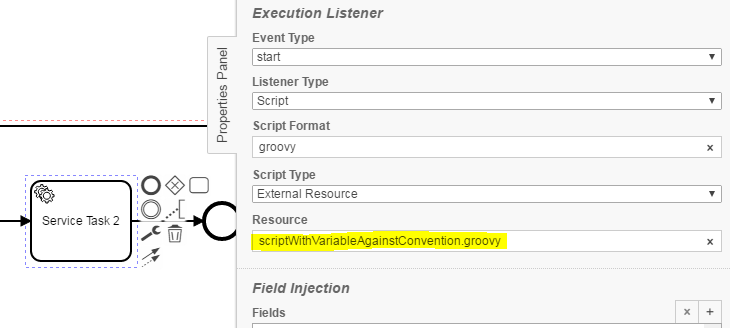Process Variables Name Convention Checker
Elements in business processes are regularly subject to naming conventions. This checker validates the names of process variables with a configurable regular expression.
- Variable name against internal convention
- Variable name against external convention
Assumptions
- The BPMN-models have to be in the classpath
Configuration
The rule should be configured as follows:
<rule>
<name>ProcessVariablesNameConventionChecker</name>
<state>true</state>
<elementConventions>
<elementConvention>
<name>internal</name>
<!-- field types for process variables -->
<elementFieldTypes excluded="true">
<elementFieldType>Class</elementFieldType>
<elementFieldType>ExternalScript</elementFieldType>
<elementFieldType>DMN</elementFieldType>
<elementFieldType>DelegateExpression</elementFieldType>
</elementFieldTypes>
<description>Variable has to start with "int_"</description>
<pattern>int_[a-zA-Z]+</pattern>
</elementConvention>
<elementConvention>
<name>external</name>
<!-- field types for process variables -->
<elementFieldTypes>
<elementFieldType>Class</elementFieldType>
<elementFieldType>ExternalScript</elementFieldType>
<elementFieldType>DMN</elementFieldType>
<elementFieldType>DelegateExpression</elementFieldType>
</elementFieldTypes>
<description>Variable has to start with "ext_"</description>
<pattern>ext_[a-zA-Z]+</pattern>
</elementConvention>
</elementConventions>
</rule>
Via <state>true/false</state> the check can be enabled or disabled
For internal and external naming conventions, elementConventions must be defined.
An element convention consists of:
- a
name - an
elementFieldTypeto be analyzed - a regular expression for the naming convention (
pattern) - a
descriptionto describe the convention (optional)
The attribute excluded = "true" means that all element field types, except those that are stored, should be checked.
ElementFieldType can take the following values:
Class, FormField, Expression, DelegateExpression, ResultVariable, CalledElement, CaseRef, CollectionElement, ElementVariable, LoopCardinality, CompletionCondition, InlineScript, ExternalScript, Assignee, CandidateUsers, CandidateGroups, DueDate, FollowUpDate, DMN, CamundaIn and CamundaOut.
Error messages
process variable is against the naming convention ‘%conventionName%’ (compare %Chapter%, %ElementFieldType%)
The message indicates that a process variable violates a specific naming convention.
%ConventionName% contains the name of the convention that has been defined within the rule.
%Chapter% and %ElementFieldType% contain information on where the process variable can be found in the Camunda Modeler for the specific BPMN element.
Solution: the variable has to be adapted to the convention.
Examples
| process variable is against the naming convention ‘external’ (compare Details, Class) |
|---|
  |
| process variable is against the naming convention ‘internal’ (compare Details, Expression) |
|---|
 |
| process variable is against the naming convention ‘external’ (compare ExecutionListener, External Script) |
|---|
 scriptWithVariableAgainstConvention.groovy:  |